
French Kiss is a 1995 romantic comedy film directed by Lawrence Kasdan and starring Meg Ryan and Kevin Kline. Written by Adam Brooks, the film is about a woman who flies to France to confront her straying fiancé and gets into trouble when the charming crook seated next to her uses her to smuggle a stolen diamond necklace. French Kiss was filmed on location in Paris, the Provence-Alpes-Côte d'Azur région of southeastern France, and Cannes. The film was released in the United States on May 5, 1995, and received mixed reviews. The film was a success and went on to earn a total worldwide gross of $101,982,854.

Pierrot is a stock character of pantomime and commedia dell'arte, whose origins are in the late seventeenth-century Italian troupe of players performing in Paris and known as the Comédie-Italienne. The name is a diminutive of Pierre (Peter), via the suffix -ot. His character in contemporary popular culture — in poetry, fiction, and the visual arts, as well as works for the stage, screen, and concert hall — is that of the sad clown, often pining for love of Columbine, who usually breaks his heart and leaves him for Harlequin. Performing unmasked, with a whitened face, he wears a loose white blouse with large buttons and wide white pantaloons. Sometimes he appears with a frilled collaret and a hat, usually with a close-fitting crown and wide round brim and, more rarely, with a conical shape like a dunce's cap.
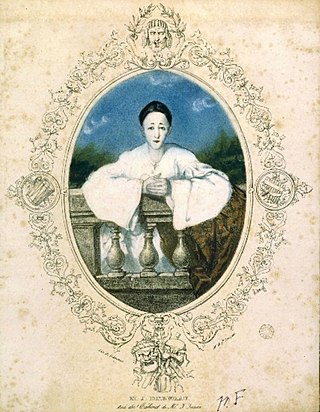
Jean-Gaspard Deburau, sometimes erroneously called Debureau, was a Bohemian-French mime. He performed from 1816 to the year of his death at the Théâtre des Funambules, which was immortalized in Marcel Carné's poetic-realist film Children of Paradise (1945); Deburau appears in the film as a major character. His most famous pantomimic creation was Pierrot—a character that served as the godfather of all the Pierrots of Romantic, Decadent, Symbolist, and early Modernist theater and art.

Pierrot le Fou is a 1965 French New Wave romantic drama road film written and directed by Jean-Luc Godard, starring Jean-Paul Belmondo and Anna Karina. The film is based on the 1962 novel Obsession by Lionel White. It was Godard's tenth feature film, released between Alphaville and Masculin, féminin. The plot follows Ferdinand, an unhappily married man, as he escapes his boring society and travels from Paris to the Mediterranean Sea with Marianne, a girl chased by OAS hitmen from Algeria.

Margherita, Archduchess of Austria-Este was an Italian princess, the first-born child of Amedeo, 3rd Duke of Aosta, and Princess Anne d'Orléans.

Going Places is a 1974 French comedy-drama film co-written and directed by Bertrand Blier, and based on his own novel. Its original title is Les Valseuses, which translates into English as "the waltzers", a vulgar French slang term for "the testicles". It stars Miou-Miou, Gérard Depardieu and Patrick Dewaere.
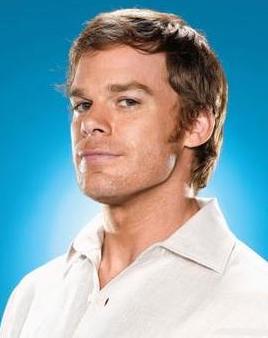
Dexter Morgan is a fictional character introduced as the antihero protagonist of the Dexter book series written by Jeff Lindsay, as well as the television series of the same name. In the television series, Dexter is portrayed by Michael C. Hall.
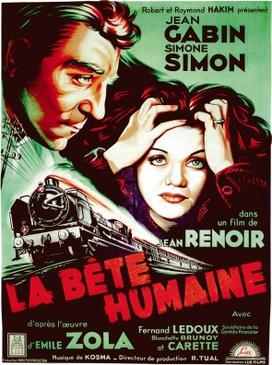
La Bête Humaine is a 1938 French film directed by Jean Renoir, with cinematography by Curt Courant. The picture features Jean Gabin and Simone Simon, and is loosely based on the 1890 novel La Bête humaine by Émile Zola.

La vie parisienne is an opéra bouffe, or operetta, composed by Jacques Offenbach, with a libretto by Henri Meilhac and Ludovic Halévy.
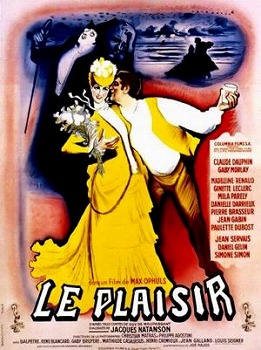
Le Plaisir is a 1952 French comedy-drama anthology film by German-born film director Max Ophüls (1902–1957) adapting three short stories by Guy de Maupassant — "Le Masque" (1889), "La Maison Tellier" (1881), and "Le Modèle" (1883).

Marguerite is a musical with a book by Alain Boublil, Claude-Michel Schönberg and Jonathan Kent, lyrics by Alain Boublil and Herbert Kretzmer, and music by Michel Legrand, with original French lyrics by Boublil. Based on the romantic novel La Dame aux Camélias by Alexandre Dumas, fils, the musical updates the story to 1940s German-occupied Paris. It tells the tale of a 40-year-old ex-singer and her affair with a young musician who is mixed up with the French Resistance, whilst she is the mistress of a Nazi officer.

Marvelous Angelique (French: Merveilleuse Angélique) is a 1965 historical romantic adventure film directed by Bernard Borderie. It is the second film in the Angélique series, based upon the novels by Anne and Serge Golon, and a sequel to Angélique, Marquise des Anges. It was made as a co-production between France, Italy and West Germany.

Road to Salina is a 1970 French-Italian psychological thriller film directed by Georges Lautner. It stars Robert Walker, Mimsy Farmer and Rita Hayworth. The film is based upon Maurice Cury's novel Sur la Route de Salina. A French-Italian coproduction, it was shot in English in the Canary Islands. Interiors were shot at the Billancourt Studios in Paris with sets designed by the art director Jean d'Eaubonne.

Jean-Charles Deburau was an important French mime, the son and successor of the legendary Jean-Gaspard Deburau, who was immortalized as Baptiste the Pierrot in Marcel Carné's film Children of Paradise (1945). After his father's death in 1846, Charles kept alive his pantomimic legacy, first in Paris, at the Théâtre des Funambules, and then, beginning in the late 1850s, at theaters in Bordeaux and Marseille. He is routinely credited with founding a southern "school" of pantomime; indeed, he served as tutor to the Marseille mime Louis Rouffe, who, in turn, gave instruction to Séverin Cafferra, known simply as "Séverin". But their art was nourished by the work of other mimes, particularly of Charles's rival, Paul Legrand, and by earlier developments in nineteenth-century pantomime that were alien to the Deburaux' traditions.

Germaine Ribière was a French Catholic, member of the Résistance, who saved numerous Jews during World War II, and was recognized as a Righteous Among the Nations.

Simone Segouin, also known by her nom de guerreNicole Minet, is a former French Resistance fighter who served in the Francs-tireurs et partisans group. Among her first acts of resistance was stealing a bicycle from a German female military messenger, which she then used to help carry messages. She went on to take part in large-scale or otherwise perilous missions, such as capturing German troops, derailing trains, and acts of sabotage.
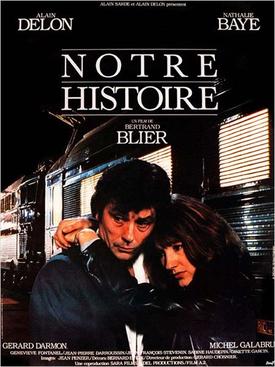
Our Story is a 1984 French absurdist comedy drama film written and directed by Bertrand Blier and starring Alain Delon and Nathalie Baye.

Familie is a Flemish television soap opera set in Mechelen. Created by Herman Verbaet, Familie was first broadcast on 30 December 1991. It has been broadcast consistently for 5-6 evenings per week, with only 2-3 month hiatuses during summer. It is currently being produced by Banijay Belgium and running on VTM.
Les Belles-de-nuit ou les Anges de la famille is an adventure novel by Paul Féval. It was first published as a roman feuilleton in the French newspaper L’Assemblée nationale from the September 21, 1849 to the April 27, 1850. The story takes place from November 1817 to November 1820 in Brittany and in Paris. The book is divided in five parts of unequal length.

Denise Vernay-Jacob was a member of the French Resistance during World War II, who operated under the aliases of "Miarka" and "Annie" from 1941. She narrowly avoided the March 1944 roundup of Jews in Nice, France which resulted in the deportation of her parents to Auschwitz concentration camp in occupied Poland. Captured less than three months later, she survived torture by the Gestapo and imprisonment at two Nazi concentration camps – Ravensbrück and Mauthausen. She was rescued by the Red Cross in April 1945 and returned home to France at the conclusion of the war.


















